【BBC六分钟英语】如何进行大脑训练?

【英文脚本】
Sophie
Hello and welcome to 6 Minute English. I’m Sophie…
Neil
Watashi-wa Ni-ru.
Sophie
What did you say?
Neil
Watashi-wa Ni-ru. ‘I’m Neil.’ It’s Japanese, Sophie.
Sophie
Very good, Neil! So your Japanese language lessons are going well, then?
Neil
They are indeed. And did you know, Sophie, that scientists believe learning a second language can boost brainpower? Bilingualism, or speaking two languages equally well, is a form of brain training.
Sophie
Brain training is where you’re learning ways to increase your memory or intelligence. That’s great Neil, but you’re not exactly… bilingual… are you?
Neil
Not yet. No.
Sophie
Well, brain training is the subject of today’s show. And ways to train your brain might be doing a crossword puzzle, playing chess, or studying a new language! Now I have a question for you, Neil.
Neil
I hope my brain is up to the challenge.
Sophie
I’m sure it is. Can you tell me: How many neurons, or nerve cells, are there in the typical human brain? Is it … a) 8.6 billion b) 86 billion Or c) 860 billion
Neil
Hmm. I’m going to say a) 8.6 billion.
Sophie
Well, we’ll find out later on in the show whether you got the answer right or not. But now let’s listen to neuropsychologist Dr Catherine Loveday talking about why being bilingual may protect your brain from damage if you have a stroke.
Dr Catherine Loveday, neuropsychologist
I think the theory behind why bilingualism might be a protective factor is that [it] involves a lot of switchings, a lot of attentional changes, lots of switching. And that seems to exercise the sort of executive parts of our brain. Those parts of the brain are kind of stronger and fitter when it comes to resisting some kind of damage from the stroke.
Neil
A stroke is a serious illness that occurs when blood flow to an area of the brain is cut off. And executive functions are the mental skills involved in doing things like problem solving and planning.
Sophie
So when a bilingual speaker switches, or changes, from one language to another, this exercises the executive parts of their brain, making it stronger and fitter. And because the brain is stronger, it’s able to resist, or prevent, damage caused by a stroke.
Neil
But many of us aren’t bilingual are we? So our brains aren’t going to be protected against strokes.
Sophie
Don’t worry, Neil. There are other things you can do to exercise your brain. If you’re right handed, doing tasks like brushing your teeth with your left hand will stimulate your brain, or getting dressed in the dark with your eyes shut. Or simply memorizing a list of words, for example your shopping list.
Neil
Doing things with the wrong hand sounds hard. But the shopping list thing sounds easier… OK. Let’s see… pizza, doughnuts, crisps, bottle of coke, chocolate cake…
Sophie
That’s not a very healthy list, Neil! A good diet is also important in keeping your brain fit and healthy.
Neil
Maybe I should cut down on the chocolate cake then?
Sophie
Actually, that’s one thing you could leave on the list. According to research, chocolate may enhance, or improve, cognitive performance, and that is your ability to acquire and utilize knowledge. Now let’s listen to Dr Loveday talking about building up our cognitive reserve, this is the idea of building up extra abilities to help protect the brain against declining memory or thinking.
Dr Catherine Loveday, neuropsychologist
Continually just stimulating the brain, things like learning a language, learning music, just educating yourself, seems to continue to build up that cognitive reserve. So even if people take up languages or take up other things later in life it will give them a degree of protection.
Neil
Stimulate means to make something become more active. Hmm. Not sure I’m continually stimulating my brain. What do you think, Sophie?
Sophie
With all our stimulating discussions, Neil, I’m sure we’re both building up our cognitive reserve. And there are your Japanese lessons too.
Neil
Well, so I am doing well as far as my cognitive reserve goes. Sophie you’ve put my mind at rest.
Sophie
And if you put someone’s mind at rest you stop them worrying. Well, don’t get too relaxed Neil, your brain needs constant stimulation, remember?
Neil
Hmm. I think I might just lie down after the show with a box of chocolates and today’s crossword… or maybe I’ll memorize another shopping list… this time in Japanese.
Sophie
OK. I think it’s time to hear the answer to today’s quiz question. I asked: How many neurons are there in the typical human brain? Is it … a) 8.6 billion b) 86 billion or c) 860 billion?
Neil
And I said a) 8.6 billion.
Sophie
I thought you were feeling clever today, Neil. I’m afraid that’s the wrong answer. It’s b) 86 billion. But do you know how scientists calculated that number?
Neil
Did they have a guess, Sophie?
Sophie
No, not exactly. Apparently, the easiest way is to count how many neurons there are in one part of the brain and then multiply that for the rest of the brain’s volume.
Neil
Well, that’s a lot of brain cells. OK, can we hear the words we learned today?
Sophie
They are: bilingualism brain training neurons stroke executive functions switches resist enhance cognitive reserve stimulate put someone’s mind at rest
Neil
Well, that’s the end of today’s 6 Minute English. Don’t forget to join us again soon!
Both
Bye.
【中英文双语脚本】
Sophie(苏菲)
Hello and welcome to 6 Minute English. I’m Sophie…
您好,欢迎来到 6 Minute English。我是 Sophie…
Neil(尼尔)
Watashi-wa Ni-ru.
Watashi-wa Ni-ru.
Sophie(苏菲)
What did you say?
你说什么?
Neil(尼尔)
Watashi-wa Ni-ru. ‘I’m Neil.’ It’s Japanese, Sophie.
Watashi-wa Ni-ru.“我是尼尔。”这是日本人,Sophie。
Sophie(苏菲)
Very good, Neil! So your Japanese language lessons are going well, then?
很好,尼尔!那么,你的日语课进展顺利吗?
Neil(尼尔)
They are indeed. And did you know, Sophie, that scientists believe learning a second language can boost brainpower? Bilingualism, or speaking two languages equally well, is a form of brain training.
他们确实是。Sophie,您知道吗,科学家们相信学习第二语言可以提高脑力?双语,或同样能说两种语言,是一种大脑训练形式。
Sophie(苏菲)
Brain training is where you’re learning ways to increase your memory or intelligence. That’s great Neil, but you’re not exactly… bilingual… are you?
大脑训练是您学习提高记忆力或智力的方法的地方。这很好,尼尔,但你不完全是……双语。。。你是?
Neil(尼尔)
Not yet. No.
还没有。不。
Sophie(苏菲)
Well, brain training is the subject of today’s show. And ways to train your brain might be doing a crossword puzzle, playing chess, or studying a new language! Now I have a question for you, Neil.
嗯,大脑训练是今天节目的主题。训练大脑的方法可能是玩填字游戏、下棋或学习一门新语言!现在我有一个问题要问你,Neil。
Neil(尼尔)
I hope my brain is up to the challenge.
我希望我的大脑能够应对挑战。
Sophie(苏菲)
I’m sure it is. Can you tell me: How many neurons, or nerve cells, are there in the typical human brain? Is it … a) 8.6 billion b) 86 billion Or c) 860 billion
我确定是的。你能告诉我:典型的人脑中有多少个神经元或神经细胞吗?是吗。。。a) 86 亿 b) 860 亿或 c) 8600 亿
Neil(尼尔)
Hmm. I’m going to say a) 8.6 billion.
嗯。我要说的是 a) 86 亿。
Sophie(苏菲)
Well, we’ll find out later on in the show whether you got the answer right or not. But now let’s listen to neuropsychologist Dr Catherine Loveday talking about why being bilingual may protect your brain from damage if you have a stroke.
好吧,我们稍后会在节目中发现您是否回答正确。但是现在让我们听听神经心理学家 Catherine Loveday 博士谈论为什么双语可以保护你的大脑在中风时免受损害。
Dr Catherine Loveday, neuropsychologist(CatherineLoveday博士,神经心理学家)
I think the theory behind why bilingualism might be a protective factor is that [it] involves a lot of switchings, a lot of attentional changes, lots of switching. And that seems to exercise the sort of executive parts of our brain. Those parts of the brain are kind of stronger and fitter when it comes to resisting some kind of damage from the stroke.
我认为双语可能是一个保护因素背后的理论是 [它] 涉及很多转换,很多注意力变化,很多转换。这似乎锻炼了我们大脑的那种执行部分。大脑的这些部分在抵抗中风造成的某种伤害时更强壮、更健康。
Neil(尼尔)
A stroke is a serious illness that occurs when blood flow to an area of the brain is cut off. And executive functions are the mental skills involved in doing things like problem solving and planning.
中风是一种严重的疾病,当流向大脑某个区域的血液被切断时就会发生。执行功能是执行问题解决和计划等事情所涉及的心理技能。
Sophie(苏菲)
So when a bilingual speaker switches, or changes, from one language to another, this exercises the executive parts of their brain, making it stronger and fitter. And because the brain is stronger, it’s able to resist, or prevent, damage caused by a stroke.
因此,当一个双语使用者从一种语言切换到另一种语言时,这会锻炼他们大脑的执行部分,使其更强大、更健康。而且由于大脑更强壮,它能够抵抗或防止中风造成的损害。
Neil(尼尔)
But many of us aren’t bilingual are we? So our brains aren’t going to be protected against strokes.
但我们中的许多人不是双语的,不是吗?因此,我们的大脑不会受到保护,不会受到中风的保护。
Sophie(苏菲)
Don’t worry, Neil. There are other things you can do to exercise your brain. If you’re right handed, doing tasks like brushing your teeth with your left hand will stimulate your brain, or getting dressed in the dark with your eyes shut. Or simply memorizing a list of words, for example your shopping list.
别担心,尼尔。您还可以做其他事情来锻炼您的大脑。如果你是右撇子,做一些事情,比如用左手刷牙会刺激你的大脑,或者在黑暗中闭着眼睛穿衣服。或者简单地记住一个单词列表,例如您的购物清单。
Neil(尼尔)
Doing things with the wrong hand sounds hard. But the shopping list thing sounds easier… OK. Let’s see… pizza, doughnuts, crisps, bottle of coke, chocolate cake…
用错误的手做事听起来很难。但购物清单这件事听起来更容易……还行。我看看。。。披萨、甜甜圈、薯片、瓶装可乐、巧克力蛋糕……
Sophie(苏菲)
That’s not a very healthy list, Neil! A good diet is also important in keeping your brain fit and healthy.
这不是一个非常健康的清单,尼尔!良好的饮食习惯对于保持大脑健康也很重要。
Neil(尼尔)
Maybe I should cut down on the chocolate cake then?
也许我应该减少巧克力蛋糕的摄入量?
Sophie(苏菲)
Actually, that’s one thing you could leave on the list. According to research, chocolate may enhance, or improve, cognitive performance, and that is your ability to acquire and utilize knowledge. Now let’s listen to Dr Loveday talking about building up our cognitive reserve, this is the idea of building up extra abilities to help protect the brain against declining memory or thinking.
实际上,这是您可以在列表中留下的一件事。根据研究,巧克力可能会增强或改善认知能力,这就是您获取和利用知识的能力。现在让我们听听 Loveday 博士谈论建立我们的认知储备,这是建立额外能力以帮助保护大脑免受记忆力或思维能力下降的想法。
Dr Catherine Loveday, neuropsychologist(CatherineLoveday博士,神经心理学家)
Continually just stimulating the brain, things like learning a language, learning music, just educating yourself, seems to continue to build up that cognitive reserve. So even if people take up languages or take up other things later in life it will give them a degree of protection.
不断地刺激大脑,比如学习语言、学习音乐、只是自我教育,似乎在继续建立这种认知储备。因此,即使人们在以后的生活中学习语言或其他事情,也会给他们带来一定程度的保护。
Neil(尼尔)
Stimulate means to make something become more active. Hmm. Not sure I’m continually stimulating my brain. What do you think, Sophie?
刺激的意思是使某物变得更加活跃。嗯。不确定我是否一直在刺激我的大脑。你怎么看,苏菲?
Sophie(苏菲)
With all our stimulating discussions, Neil, I’m sure we’re both building up our cognitive reserve. And there are your Japanese lessons too.
通过我们所有刺激的讨论,Neil,我敢肯定我们都在建立我们的认知储备。还有你的日语课。
Neil(尼尔)
Well, so I am doing well as far as my cognitive reserve goes. Sophie you’ve put my mind at rest.
嗯,就我的认知储备而言,我做得很好。苏菲,你让我放心了。
Sophie(苏菲)
And if you put someone’s mind at rest you stop them worrying. Well, don’t get too relaxed Neil, your brain needs constant stimulation, remember?
如果你让某人的心平静下来,你就可以让他们停止担心。好吧,不要太放松,尼尔,你的大脑需要不断的刺激,记得吗?
Neil(尼尔)
Hmm. I think I might just lie down after the show with a box of chocolates and today’s crossword… or maybe I’ll memorize another shopping list… this time in Japanese.
嗯。我想我可能会在演出结束后带着一盒巧克力和今天的填字游戏躺下……或者我会记住另一个购物清单……这次是日语。
Sophie(苏菲)
OK. I think it’s time to hear the answer to today’s quiz question. I asked: How many neurons are there in the typical human brain? Is it … a) 8.6 billion b) 86 billion or c) 860 billion?
还行。我认为是时候听听今天测验问题的答案了。我问道:典型的人脑中有多少个神经元?是吗。。。a) 86 亿 b) 860 亿或 c) 8600 亿?
Neil(尼尔)
And I said a) 8.6 billion.
我说 a) 86 亿。
Sophie(苏菲)
I thought you were feeling clever today, Neil. I’m afraid that’s the wrong answer. It’s b) 86 billion. But do you know how scientists calculated that number?
我以为你今天感觉很聪明,Neil。恐怕这是错误的答案。它是 b) 860 亿。但是你知道科学家们是怎么计算这个数字的吗?
Neil(尼尔)
Did they have a guess, Sophie?
他们猜到了吗,苏菲?
Sophie(苏菲)
No, not exactly. Apparently, the easiest way is to count how many neurons there are in one part of the brain and then multiply that for the rest of the brain’s volume.
不,不完全是。显然,最简单的方法是计算大脑某一部分有多少个神经元,然后乘以大脑其余部分的神经元。
Neil(尼尔)
Well, that’s a lot of brain cells. OK, can we hear the words we learned today?
嗯,那是很多脑细胞。好,我们能听到今天学到的单词吗?
Sophie(苏菲)
They are: bilingualism brain training neurons stroke executive functions switches resist enhance cognitive reserve stimulate put someone’s mind at rest
它们是: 双语 大脑训练 神经元 中风 执行功能 开关 抵抗 增强认知储备 刺激 使某人的心灵得到休息
Neil(尼尔)
Well, that’s the end of today’s 6 Minute English. Don’t forget to join us again soon!
好了,今天的六分钟 English 到此结束。别忘了很快再次加入我们!
Both(双)
Bye.
再见。

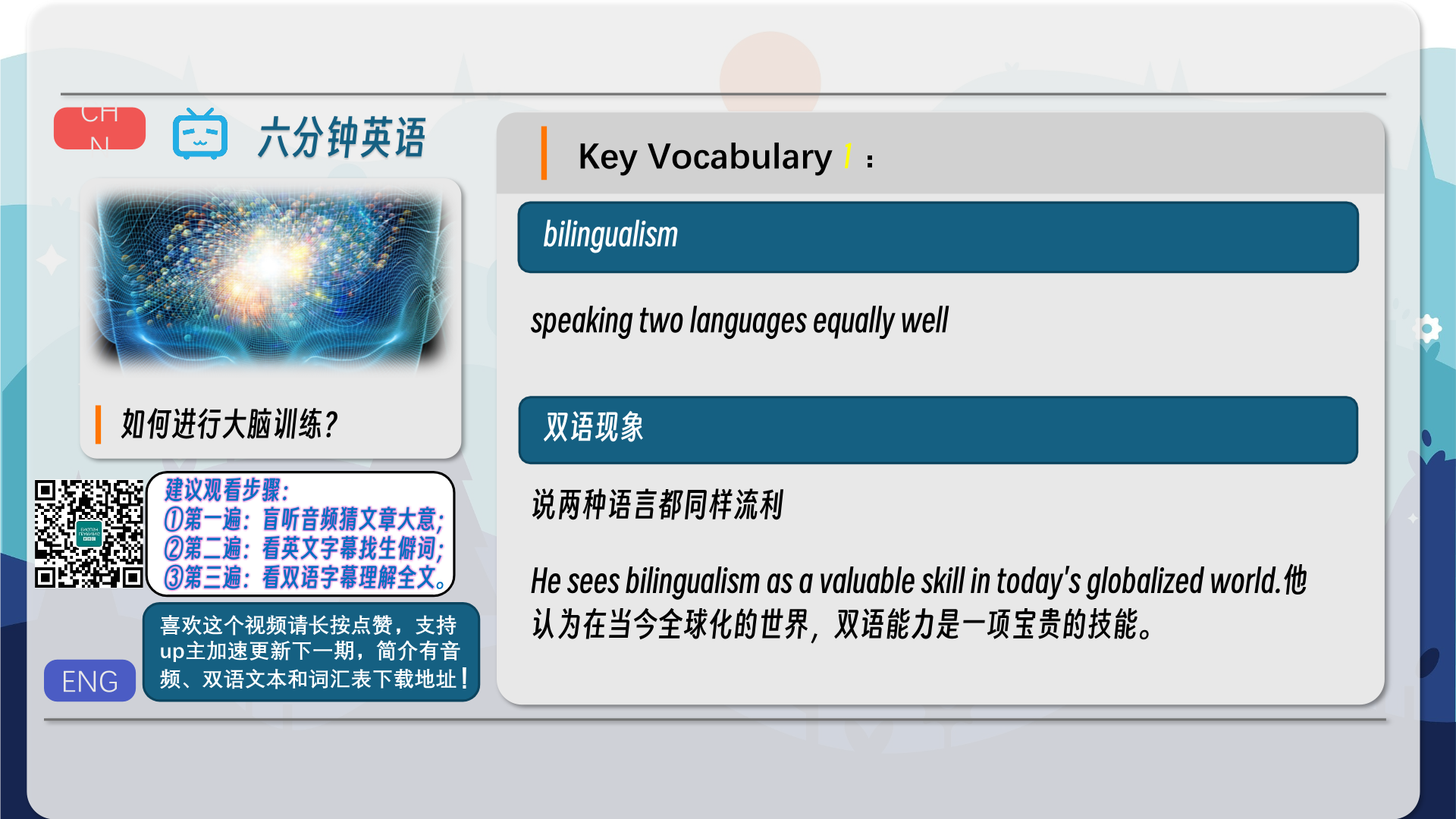
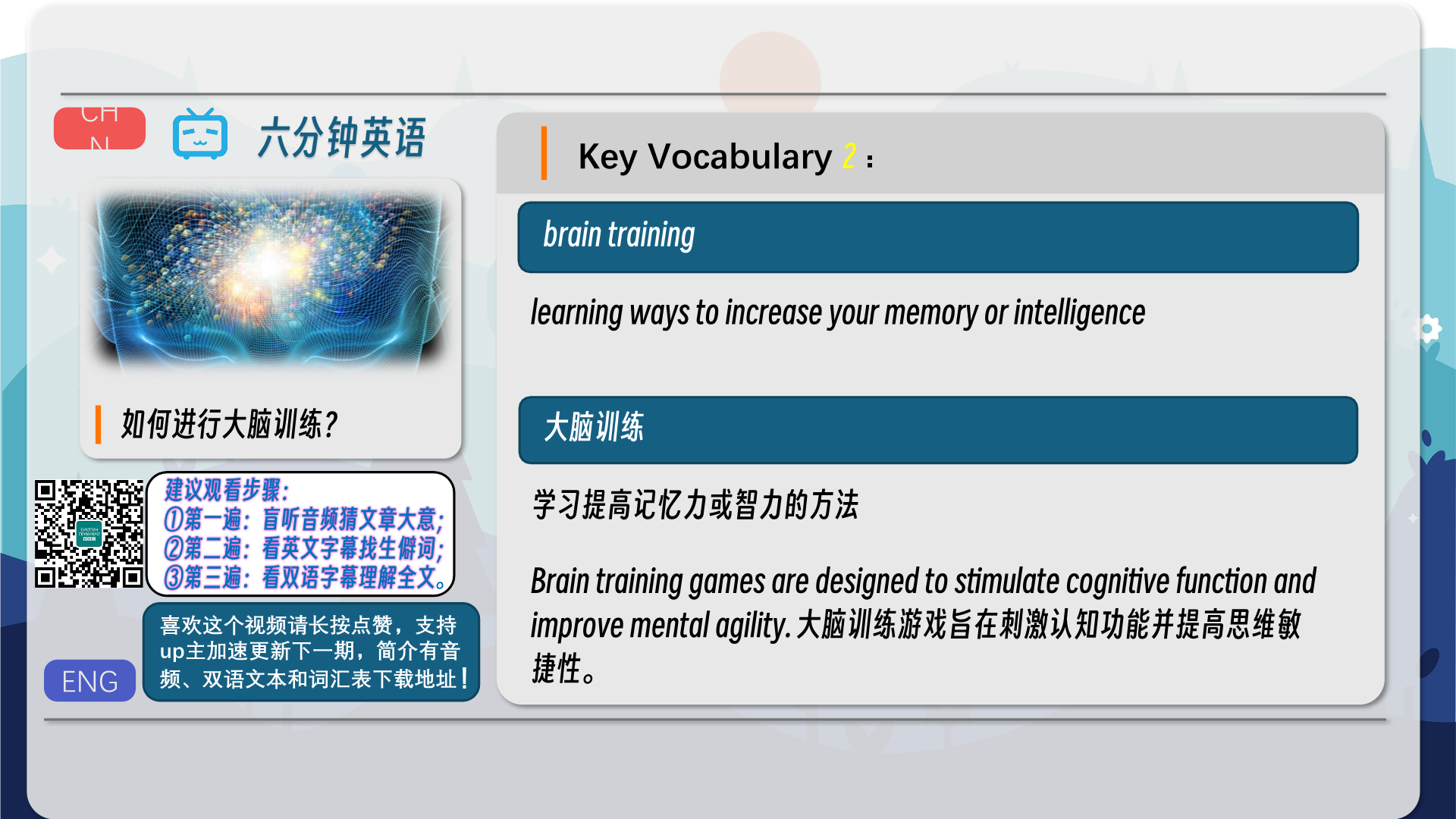
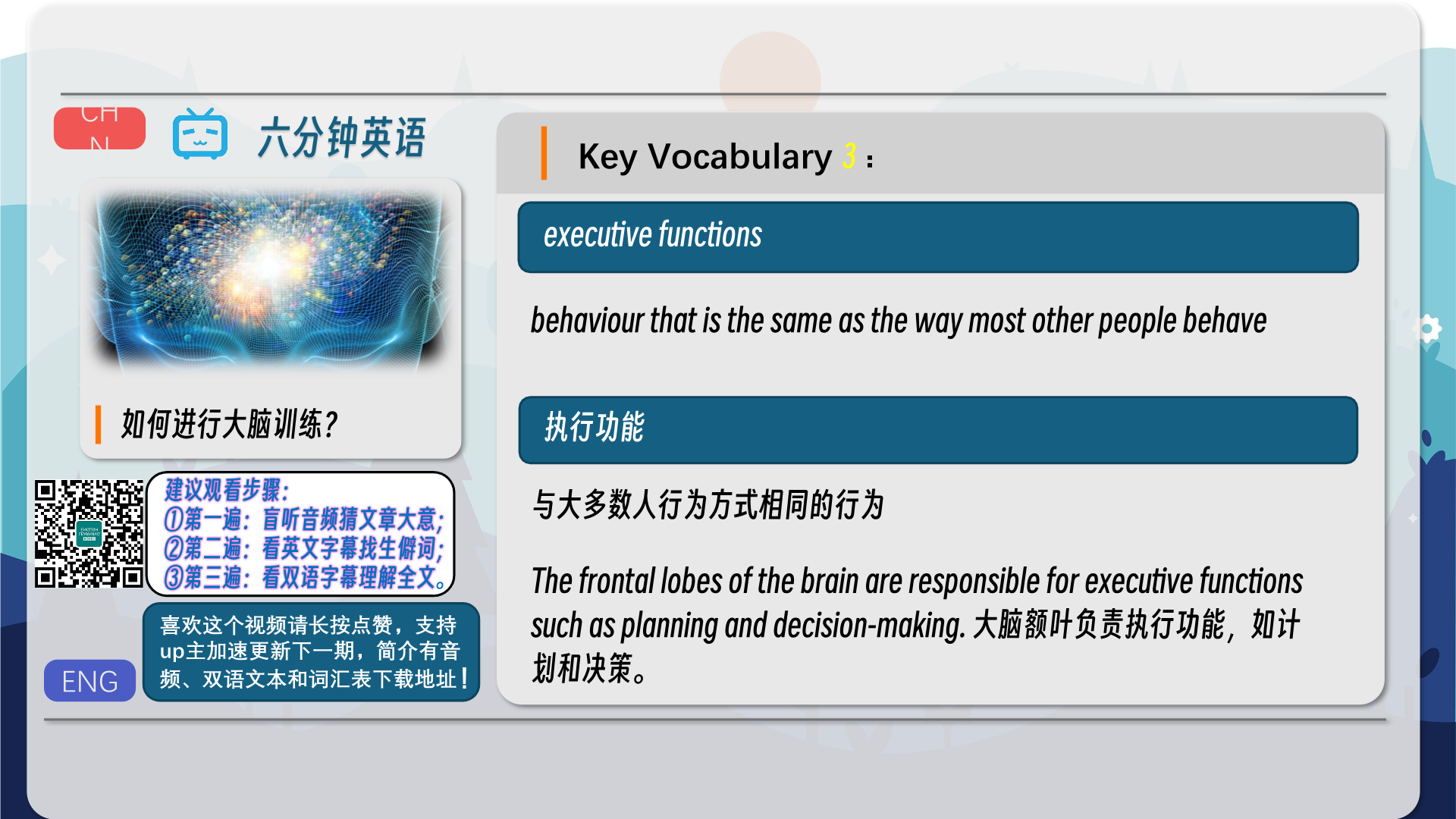
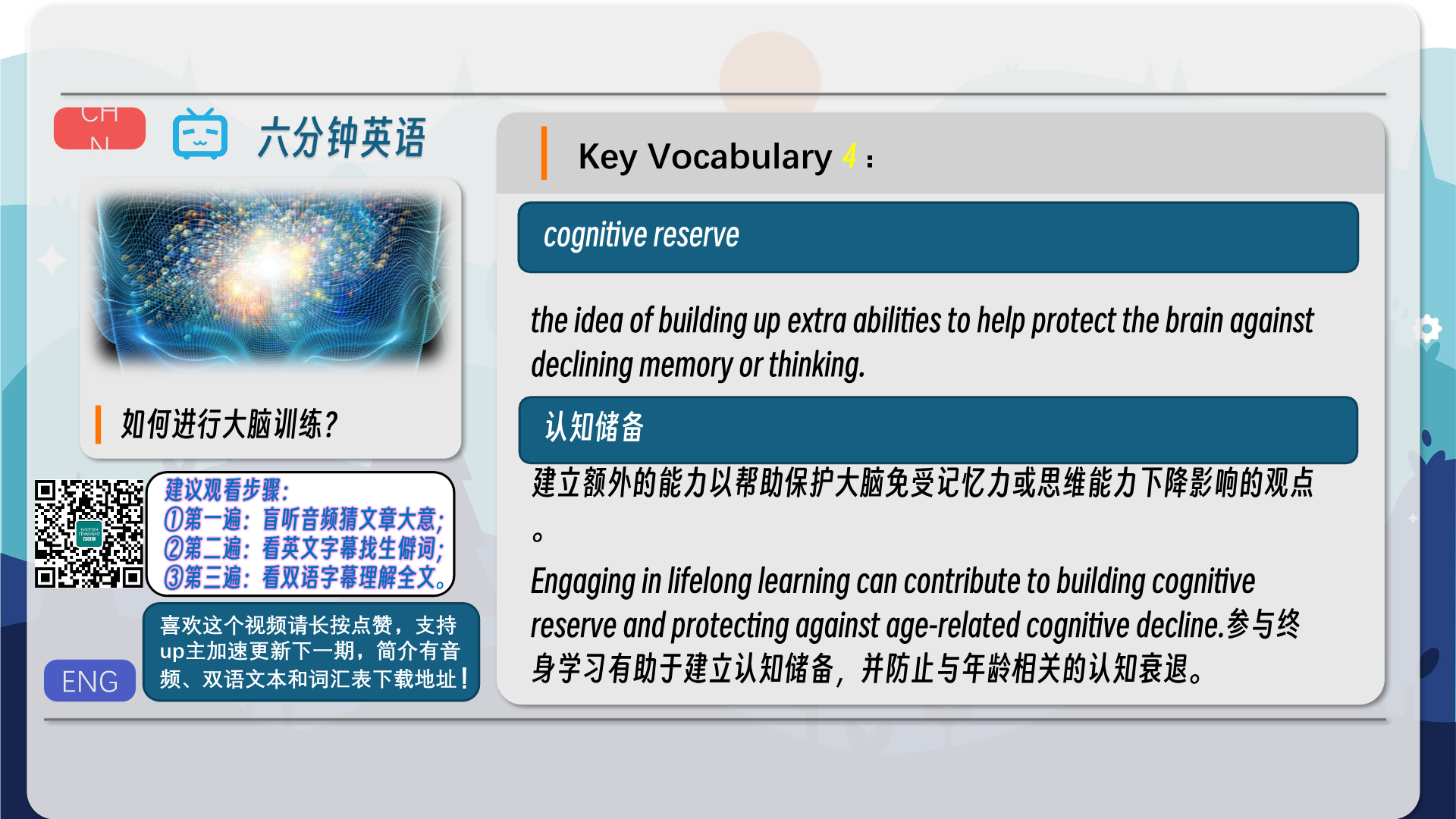
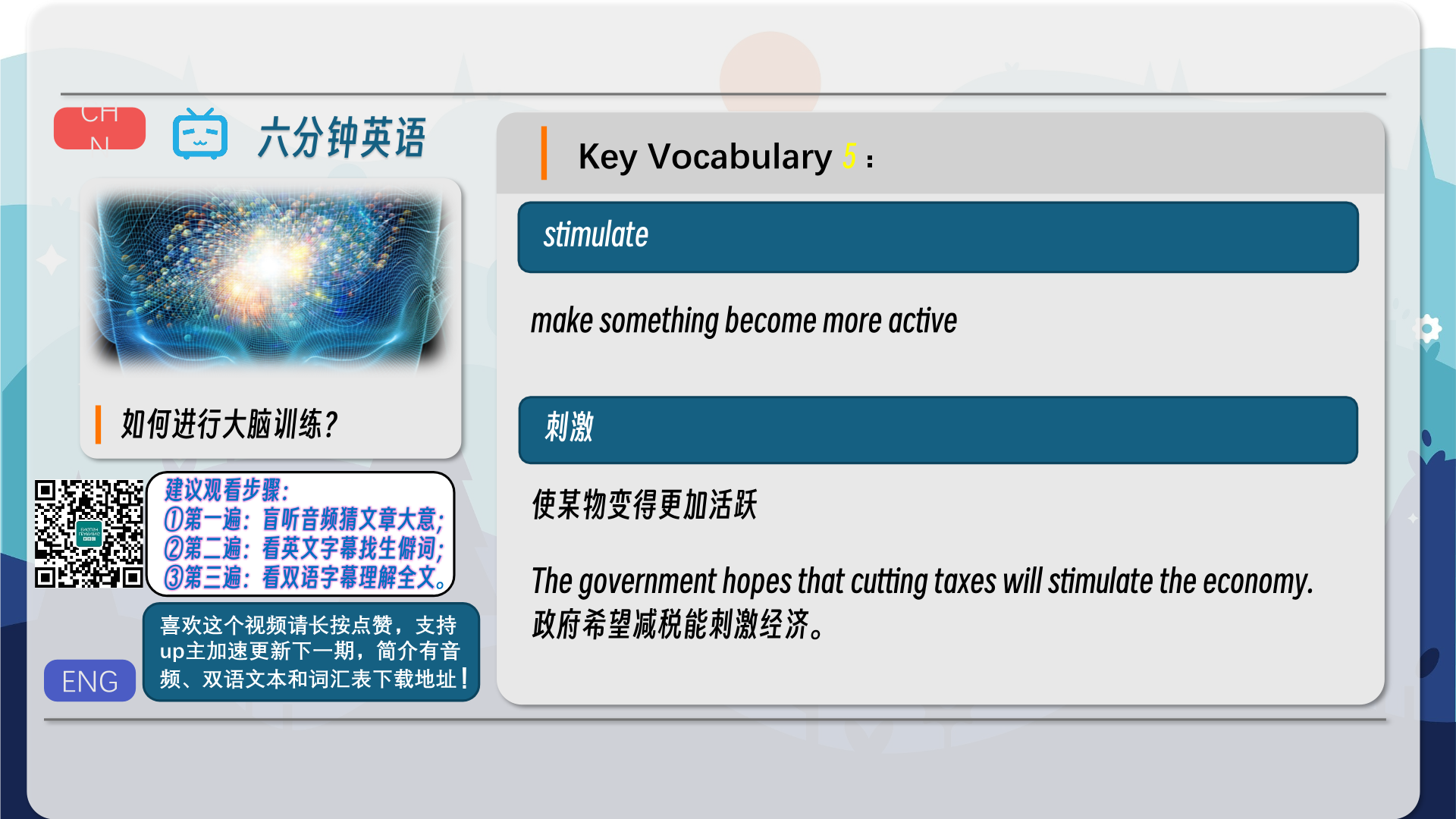
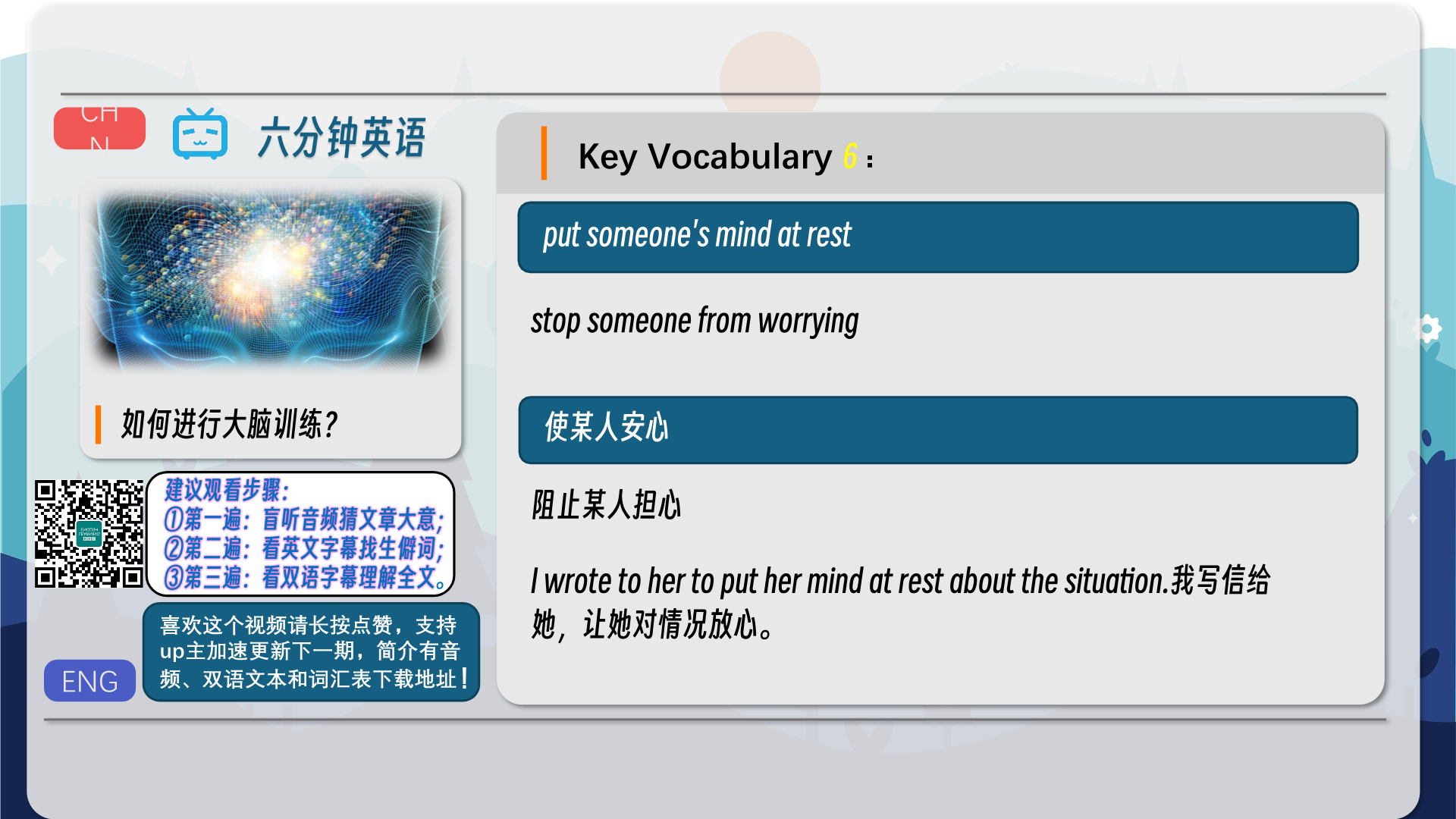
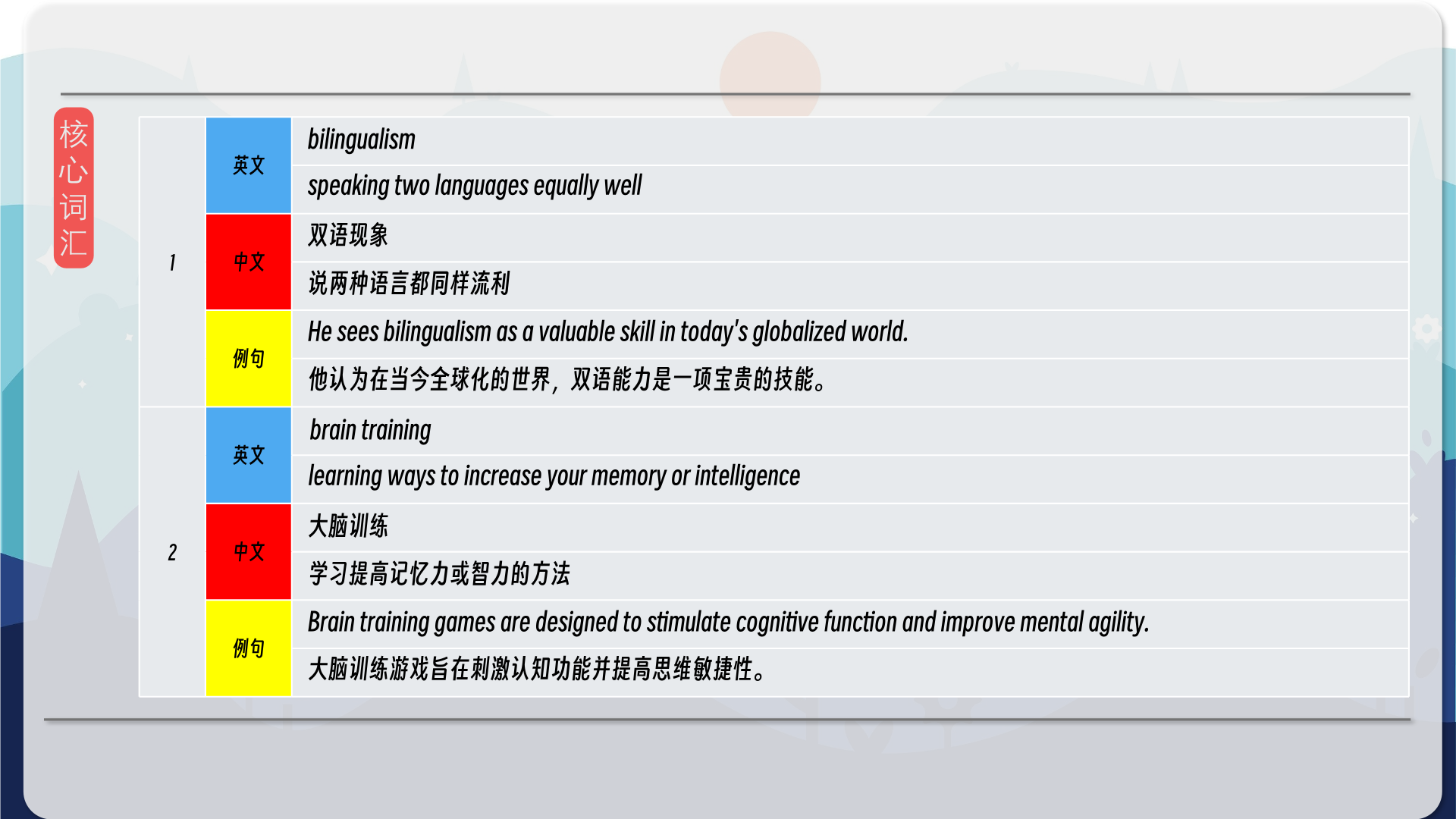
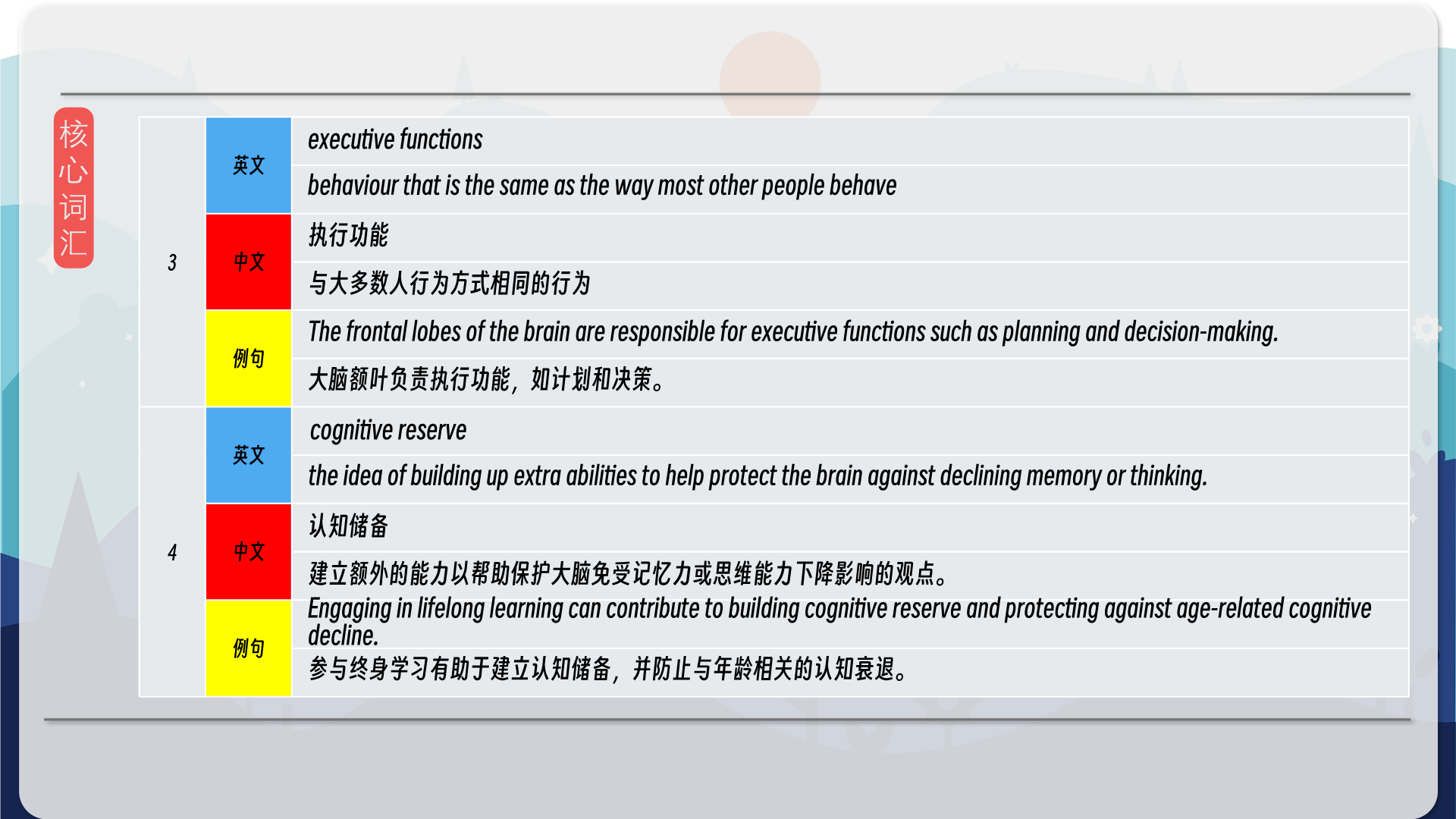
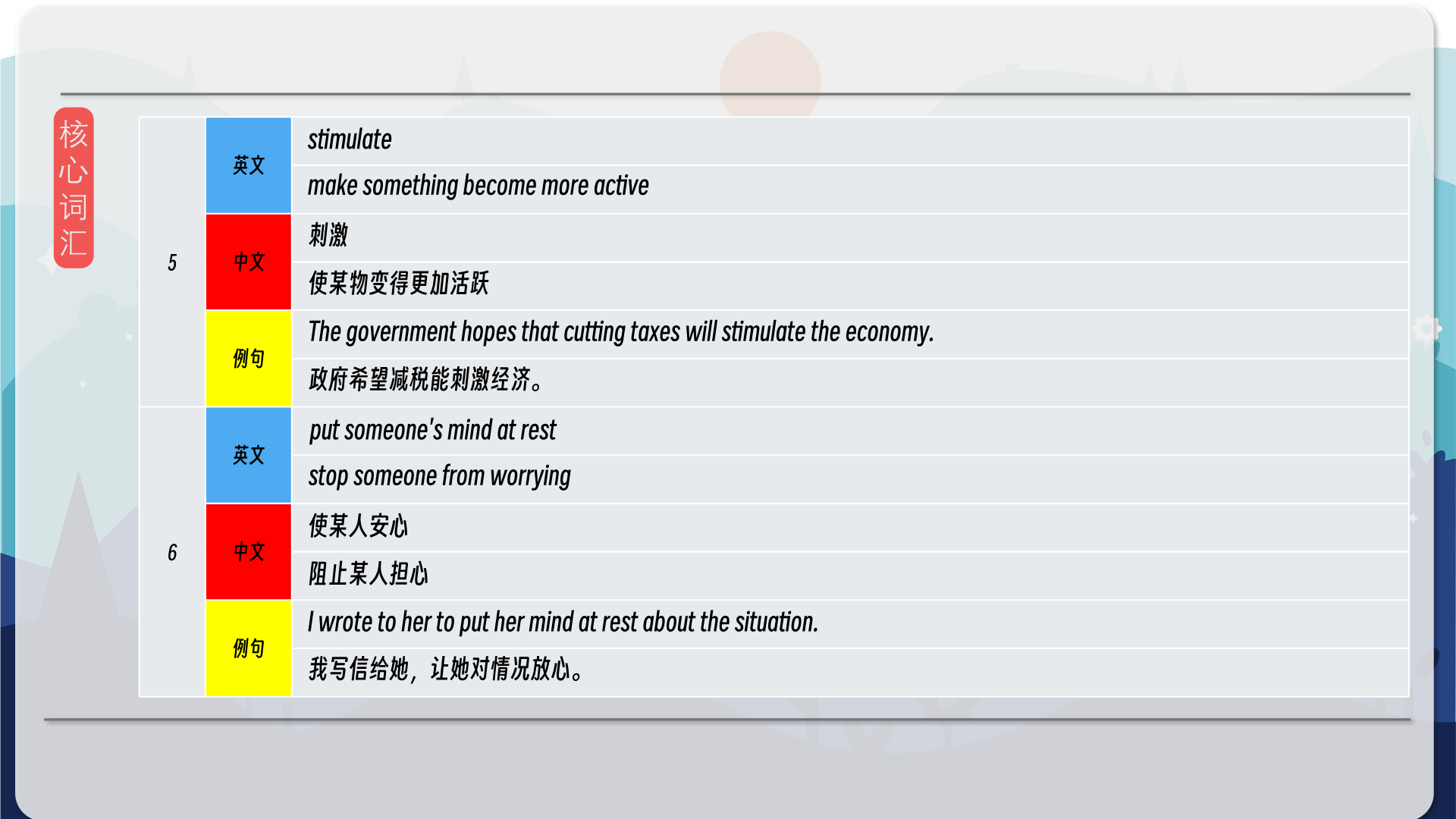
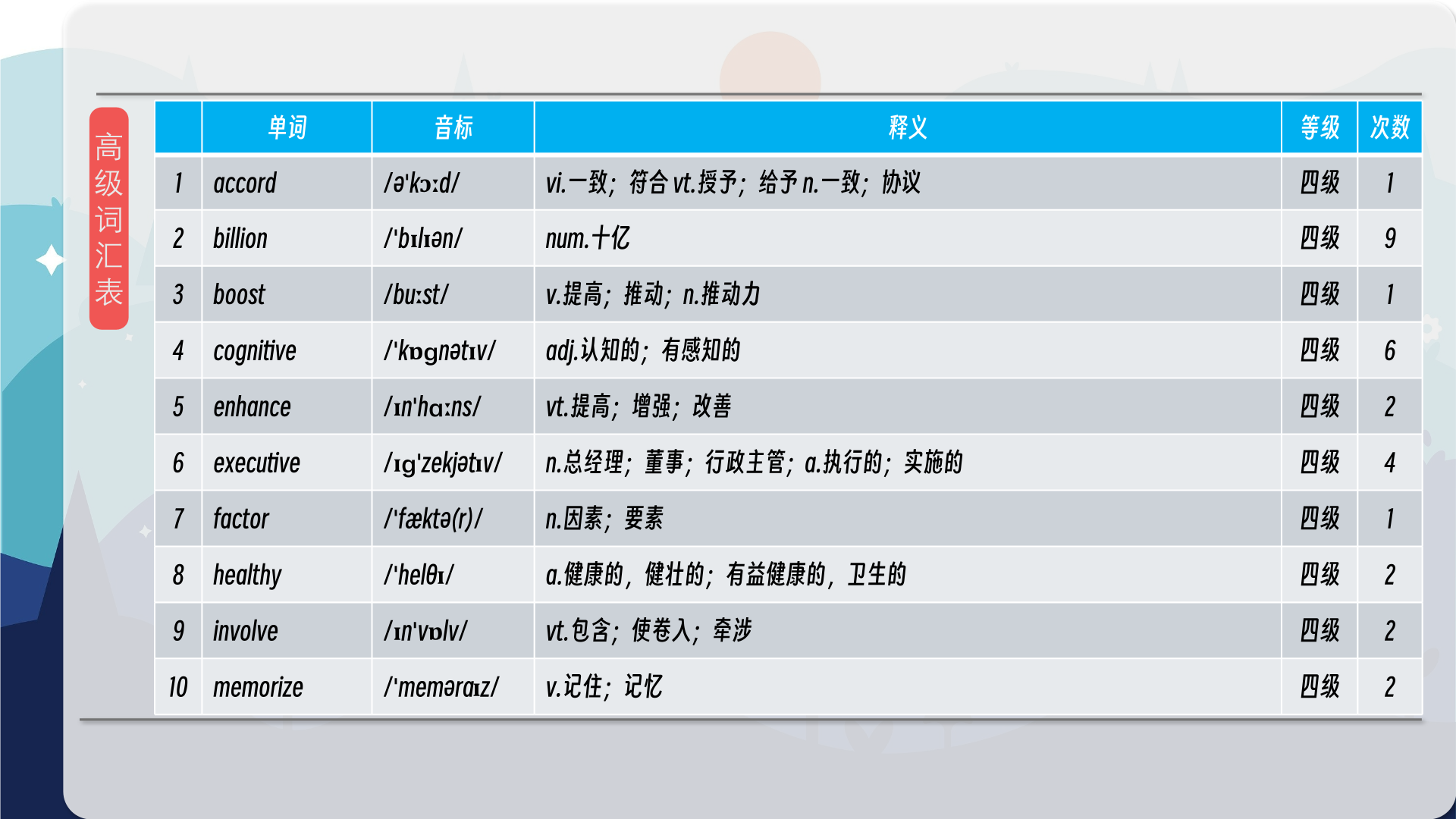
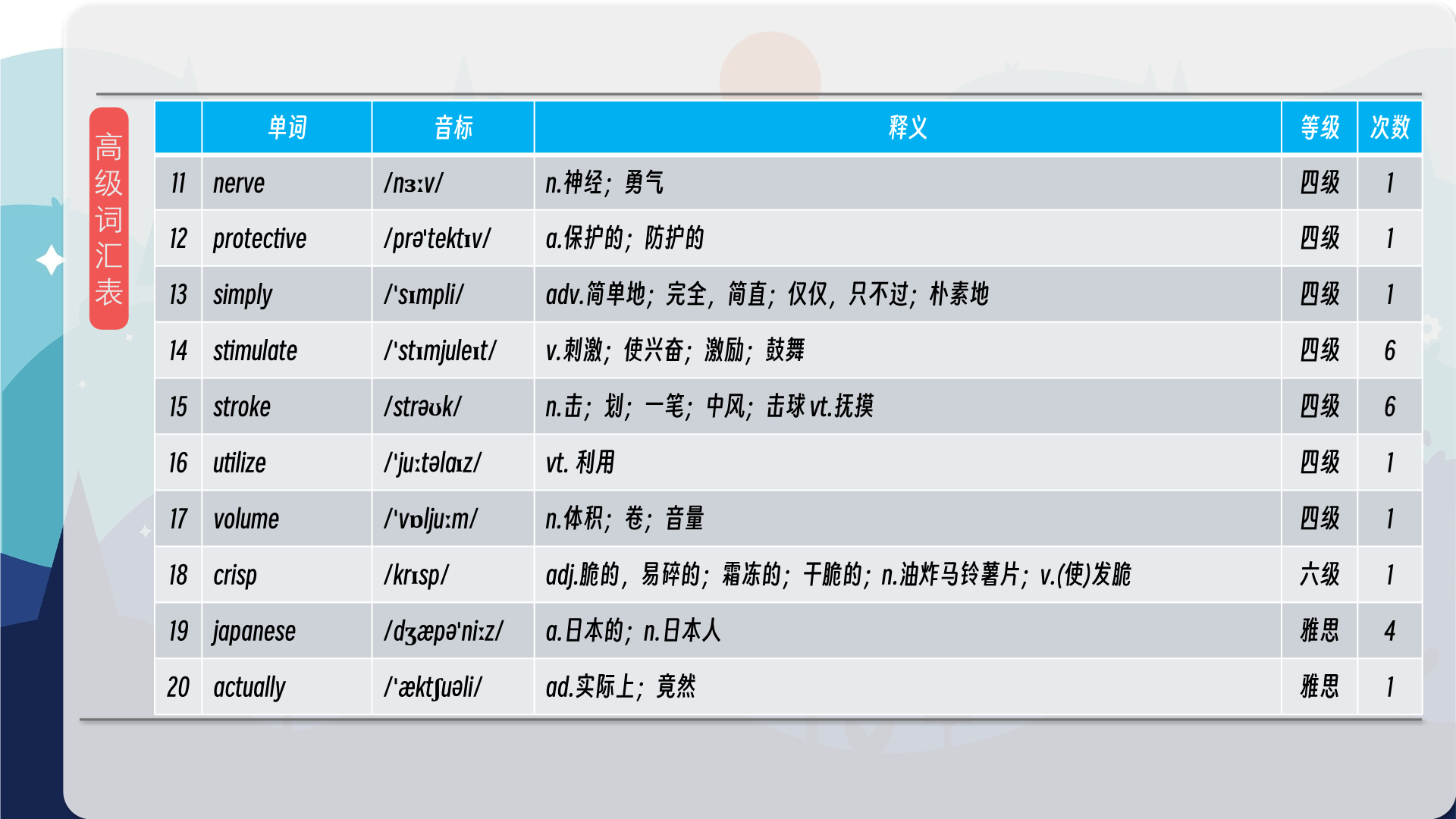
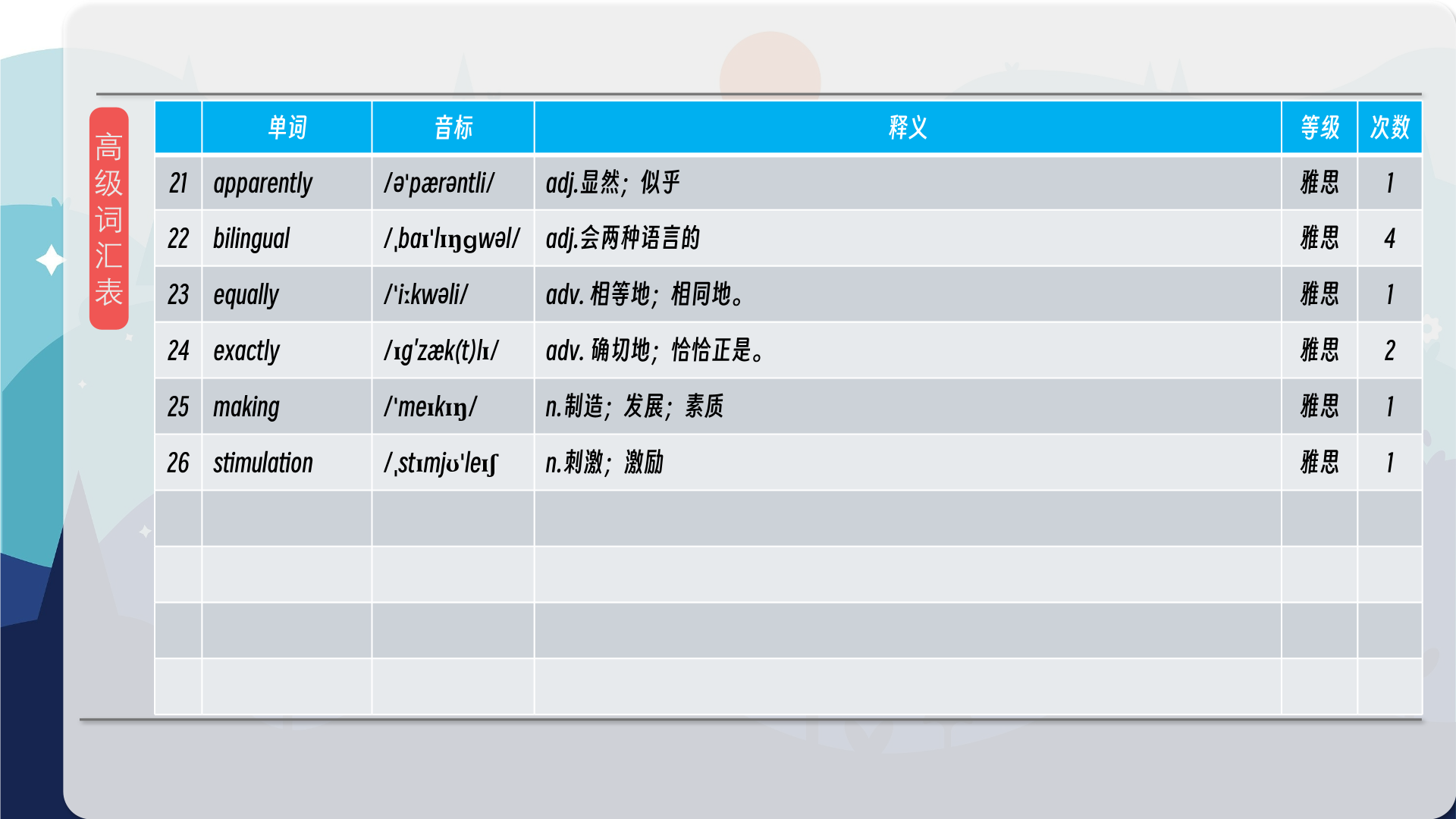

【核心词汇】
bilingualism
speaking two languages equally well
双语现象
说两种语言都同样流利
He sees bilingualism as a valuable skill in today’s globalized world.
他认为在当今全球化的世界,双语能力是一项宝贵的技能。
brain training
learning ways to increase your memory or intelligence
大脑训练
学习提高记忆力或智力的方法
Brain training games are designed to stimulate cognitive function and improve mental agility.
大脑训练游戏旨在刺激认知功能并提高思维敏捷性。
executive functions
behaviour that is the same as the way most other people behave
执行功能
与大多数人行为方式相同的行为
The frontal lobes of the brain are responsible for executive functions such as planning and decision-making.
大脑额叶负责执行功能,如计划和决策。
cognitive reserve
the idea of building up extra abilities to help protect the brain against declining memory or thinking.
认知储备
建立额外的能力以帮助保护大脑免受记忆力或思维能力下降影响的观点。
Engaging in lifelong learning can contribute to building cognitive reserve and protecting against age-related cognitive decline.
参与终身学习有助于建立认知储备,并防止与年龄相关的认知衰退。
stimulate
make something become more active
刺激
使某物变得更加活跃
The government hopes that cutting taxes will stimulate the economy.
政府希望减税能刺激经济。
put someone’s mind at rest
stop someone from worrying
使某人安心
阻止某人担心
I wrote to her to put her mind at rest about the situation.
我写信给她,让她对情况放心。
在公众号里输入6位数字,获取【对话音频、英文文本、中文翻译、核心词汇和高级词汇表】电子档,6位数字【暗号】在文章的最后一张图片,如【220728】,表示22年7月28日这一期。公众号没有的文章说明还没有制作相关资料。年度合集在B站【六分钟英语】工房获取,每年共计300+文档,感谢支持!